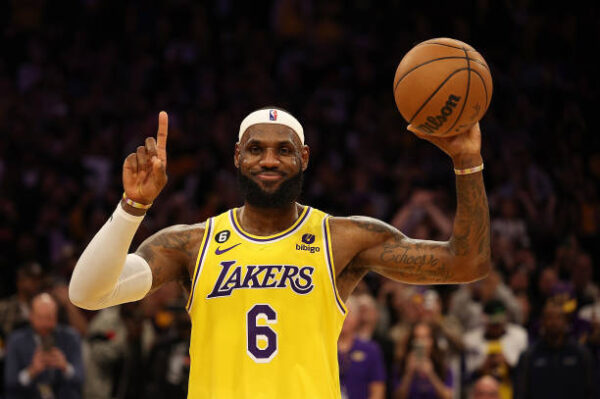Basketball legend LeBron James has reportedly been asked to leave the U.S. national basketball team following his public endorsement of Kamala Harris for president. LeBron’s decision to post his endorsement in a video contrasting former President Donald Trump’s divisive comments with Harris’s campaign sparked intense debate online, reverberating through both the sports and political spheres. The team’s response, which noted that LeBron’s endorsement “doesn’t align with the team’s mission,” has left fans and analysts divided, questioning the boundaries of athletes’ roles in political discourse.
The national team issued a statement emphasizing the importance of unity and neutrality, noting, “We represent all Americans, and we strive to keep partisan politics separate from the court.” LeBron’s endorsement, shared just days before the election, seemingly clashed with the team’s stance on neutrality. In his post, James urged his followers to vote for Harris, highlighting her vision in contrast to Trump’s controversial comments on immigration and social issues. “When I think about the future for my kids, the choice is clear. VOTE KAMALA HARRIS!” James captioned his video.
For LeBron, the decision to endorse Harris was a personal one, based on his hopes for his children’s future and a clear stand on issues he feels passionate about. But for some fans, as well as officials within the U.S. team, his action was too polarizing. The team’s management acted quickly, explaining that James’s choice to enter a heated political debate was “distracting from the team’s goals.” The move has ignited a wider discussion around whether the team’s concept of neutrality is truly unbiased or whether it’s selective, with critics noting that athletes’ political expressions are often celebrated—so long as they’re deemed acceptable.
Sports analyst Jess Miller pointed out the irony in the team’s stance, saying, “It’s strange that athletes are celebrated for speaking up—except when it doesn’t align with certain values.” Fans and fellow players are now asking what the team’s stance really represents. Is it truly an effort to stay politically neutral, or is it an effort to avoid controversy by choosing not to associate with certain perspectives?
In response to the backlash, James was unafraid to address the controversy head-on. Posting a follow-up message, he wrote, “I’ve always stood up for what I believe in, no matter the cost. If standing up for my family’s future isn’t something that’s welcome here, maybe this isn’t the team I thought it was.” This statement resonated with many, sparking a wave of support from fans, athletes, and public figures who applauded his decision to stand by his beliefs. Golden State Warriors star Draymond Green added to the conversation, tweeting, “LeBron is showing real leadership. Doing what’s right isn’t always popular, but that’s what makes it important.”
At the same time, some critics argued that James should have kept his political opinions out of the national team’s sphere to maintain unity. These voices suggest that, by choosing sides, James placed his personal views above the team’s unity. “This isn’t about LeBron or Harris; it’s about representing everyone,” tweeted one user. Meanwhile, supporters of James argue that he is exercising his right to free speech and standing up for causes he believes in. “If you disagree, that’s fine. But he has every right to speak his mind,” wrote a fan on Instagram.
For many, the team’s decision feels like a rejection of James’s history and contributions both on and off the court. “He’s done so much for the sport, his community, and the country,” commented a loyal fan. “Punishing him for standing up for his beliefs is wrong.” Others, however, feel the team was correct in distancing itself from LeBron’s endorsement, arguing that he is supposed to represent everyone on the team, not just one political side.
LeBron’s endorsement of Kamala Harris places him among a growing number of public figures using their platforms to rally support for candidates. Celebrities like Beyoncé, Taylor Swift, and Arnold Schwarzenegger have also publicly backed Harris, but the reaction to LeBron’s endorsement—especially with the U.S. team taking such a firm stance—highlights the unique scrutiny athletes face. Political analyst Jim Waters has pointed out that the backlash against James reflects a double standard in sports, where political statements are often tolerated only when they align with mainstream narratives. “Athletes’ voices are celebrated when they fit a certain mold, but they’re told to stay quiet when they stray from that line,” Waters commented.
LeBron’s departure from the team raises the question of where he will channel his energy next. Known as a player who has never shied away from social issues, LeBron’s legacy extends beyond basketball; he’s a vocal advocate for social change. This episode may only solidify his resolve, as he shows no signs of retreating from his public stance on political matters. In a recent post, he hinted that this chapter is just one part of his journey, quoting Alexander Hamilton, “If you stand up for nothing, you fall for everything.” The post quickly gained traction online, with fans praising him as “a true leader” and “the voice we need right now.”
The incident also brings to light the ongoing debate around whether sports and politics should intersect. Some fans argue that sports should be an escape from political and social issues, while others believe that athletes should have the freedom to express themselves on any topic. This debate echoes the challenges athletes like LeBron face in balancing their influence and personal beliefs with their responsibilities as representatives of their teams or leagues.
As the situation unfolds, LeBron’s choice to stand firm on his endorsement emphasizes that his priorities extend beyond the basketball court. While it’s uncertain whether his endorsement will sway votes, the message he sends by standing his ground on his beliefs is powerful. It shows that his commitment to his principles and his family’s future holds more weight than any single title or team association.
This event could mark the start of a larger conversation on the limits of political expression within the sports world. The backlash to LeBron’s endorsement may also serve as a moment of reflection for the U.S. team and the sports industry at large, urging them to reconsider what it means to truly stand neutral and whether such neutrality is even possible. For LeBron, this episode is a reminder that he remains as committed as ever to his values.


